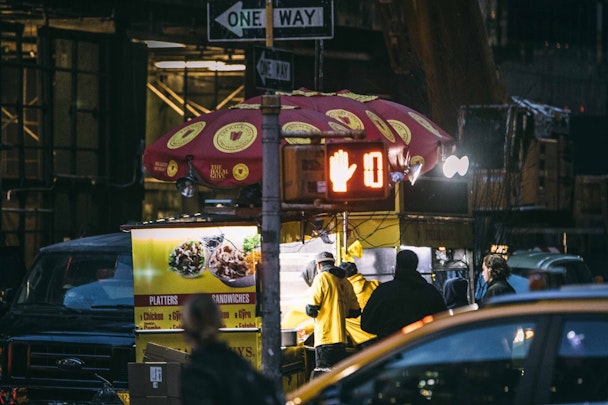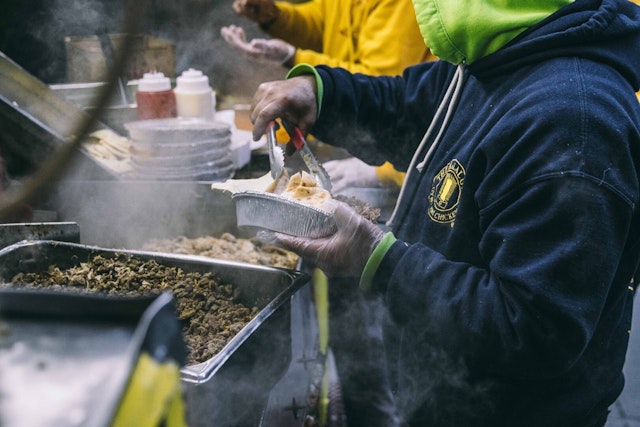
Advertisement

“Our customers are not just Muslim. Our customers are everyone. We make food for everyone.”
From a humble New York food truck to international empire, the story of The Halal Guys exemplifies the west’s newfound demand for proudly Muslim brands.
On any given day in New York City, thousands of street food vendors park up their diesel-powered carts, slide open their hatches and scroll meditatively on their iPhones as they wait for the lunchtime rush. They hustle as tirelessly as their financier counterparts in the skyscrapers of Midtown and Wall Street, on public holidays, on religious holidays, through the winter weeks when the doors of their trucks freeze shut and on days when the city’s summer heat makes the sidewalks sweat.
Not many of them have a brand and even fewer have an online presence. But The Halal Guys, with its steaming carts across Manhattan, can claim a five-star TripAdvisor rating, a line of special sauces, a cult following and an international empire.
The ‘guys’ in question are Muhammed Abouelenein, Ahmed Elsaka and Abdelbaset Elsayed, a triplet of Egyptian immigrants who started catering for the tastes of Muslim cab drivers from a cart on 53rd and Sixth in 1990. Poster boys for the American Dream, the trio have now grown their operation to five trucks in New York City and franchise restaurants in Toronto, Jakarta, Seoul and London. More than 400 locations are currently in development.
The Halal Guys serves ‘American halal’ – meat permissible by the accords of Islam atop bright orange rice and slathered in the brand’s nebulously named White Sauce. And while it may be characterizing the west’s newfound demand for good-quality, reasonably priced, proudly Muslim brands, it is just part of a growing wave of similar businesses sweeping the international scene.

Whole Foods and its parent company Amazon now stock the organic halal brand Saffron Road, while halal baby food brand For Aisha can be bought in UK supermarkets Asda and Sainsbury’s. Some fast-food giants, meanwhile, now not only offer halal food in Muslim-majority countries such as Indonesia and Malaysia, but have brought it to a number of their restaurants in the west, with KFC supplying 110 of its UK restaurants with halal chicken and Nando’s putting it on the menu at 74 British outlets.
The reasons for a brand entering this space are relatively clear: economic and humanitarian immigration has seen Muslim populations increase throughout Europe and North America, while second- and third-generation migrants continue to adhere to Islamic principles despite the western influence around them. The population is currently underserved with choice, and there are gains to be made by companies able to fill the market gap.
“People are grounding themselves in their Islamic identity a lot more and millennials and Generation Z seem to be indexing toward more traditional views and sticking to halal,” says Asad Dhunna, founder of minorities marketing consultancy The Unmistakables. “This could be because they want to have closer bonds to their home country, and food is often the number one way to make those connections.”
Additionally, younger Muslims are still likely to eat halal even if they choose to stray from the bulk of other religious ritual, such as daily prayers and wearing the hijab, notes professor Jonathan AJ Wilson, a founding partner at strategy firm Dragonfly Black and author of the book Halal Branding.
“A lot of Muslims care about food more than you’d expect,” he says. “It doesn’t necessarily follow that the person who prays five times a day, doesn’t drink alcohol and fasts during Ramadan is the only one who cares about halal. The recent phenomenon over the past couple of decades or so has been overtly labeling something as halal in non-Muslim-majority countries, because people are concerned over contamination.”

But while a significant proportion of Muslims are claiming ownership of their culinary-religious identity and growing the halal market, a certain genre of political hyper-consumerism has emerged on the other side.
Post-9/11, anti-Muslim rhetoric has done nothing to encourage brands to embrace and capitalize on the hunger for halal; the social media damnation Cadbury annually receives for producing halal Easter eggs (purely because they do not contain meat or alcohol) is proof that brands are not immune from racist, and ultimately damaging, attacks from the far right.
“I’ve seen people who should know better – who are well traveled and educated – who are really against it when their work starts to serve halal chicken in their canteen,” says Wilson. “It’s that whole ‘not in my backyard’ syndrome.”
Yet despite operating in a country where the president once toyed with the idea of a ‘Muslim ban’, The Halal Guys remains unaffected by this backlash, according to its international marketing manager Justin Bartek.
“When I started almost three years ago, I asked our chief exec: ‘Do you have any worries with Trump in office? Will that affect anything?’ And he literally looked me in the eye and said: ‘No, we don’t. We don’t worry about that at all. We focus on the food quality and we focus on our customers.’
“He said: ‘Our customers are not just Muslim. Our customers are everyone. We make food for everyone.’ And in my experience, we don’t really feel any of it. We focus on making good food and our messaging isn’t tailored to a certain population.”
Bartek’s messaging and the marketing that carries it are more in keeping with exclusive sportswear brands than smoking NYC food trucks. Partnerships are key; he’s inked irreverent collaborations with the likes of shoe brand Clarks, boutique Extra Butter and accessories brand Halal Socks to create branded, limited-edition merchandise.
“At our size, the fact that we do those things gets people excited about us – it attracts them to our brand in a whole other way,” he says. “I never think that we’re too small to do something or no one’s going to pay attention to it.
“Millennials are looking for authenticity in brands... we have that in spades. It’s a story that’s amazing and it’s a story that’s super-authentic, so it’s easy to build off that story in these other lanes, like apparel. The kids love it because they know we’re real.”
It’s this attitude – one that elevates halal beyond the Muslim population and into the mainstream – that Wilson believes will carry this wave of brands forward and grow the category.
“Businesses that will win will be the ones that move away from the identity politics and ask which factors of halal would be interesting to a mainstream audience,” he says.
“That could be the greater scrutiny on contamination, on food security or on fair treatment of workers. It’s where you push those ethical principles. If you want to go mainstream, you’ve got to think not like religious clergy but like smart businesspeople and cultural disruptors.”
With merchandise drops and franchisee demand, The Halal Guys looks to be one of the first to make this break into the mainstream. And if a 90s food truck with ‘halal’ proudly displayed in its name can make it in the US, surely it’s now anyone’s game.